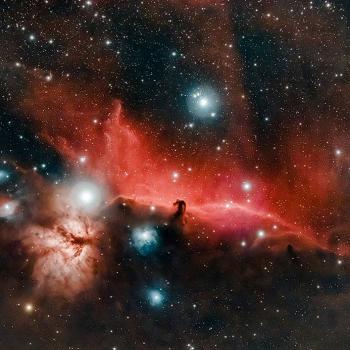Michael: We do live in a sort of hyper-individualistic culture that's really taken its toll on the souls of human beings, and there is a desperate longing for authentic relationship. Talking about the Trinity with some of those who are not Christians may sound kind of ironic, but it may be a nice entryway into a discussion about relationship with the God of Jesus Christ. Let them know that there's a reason they long for relationships that are not broken and that don't involve hurt and the kind of suffering that so many people have experienced. Let them know that they long for such relationships because God himself exists in an eternal loving relationship, and we were created to live together in a harmonious community that participates in the life of the Triune God.
Charles: For me, this notion of Trinity is an invitation into the Divine Life that we share, and thus we become ambassadors for Christ who invites other people into the same life. I find it difficult to talk about the inner life of God and explain how that translates immediately to something like how I treat my wife. Nonetheless, it seems to me that this character of God in community invites us into this life, and then we in turn invite others. That view of God has a lot of practical implications for how I treat people and how the Church is called to reach out to others -- we become an invitational people. As we live out a Trinitarian spirituality, we invite people into something that's extraordinary.
Michael: In many ways the Doctrine of the Trinity is relevant for every circumstance of life because it reminds us that Jesus Christ is present with us at every moment in the power of the Spirit. That to me is incredibly comforting, and it gives me a confidence with which I can live the Christian life and face anything that any other creature or aspect of creaturely existence could throw at me. God is for me. God is with me. And God is in me. And so, the Doctrine of the Trinity intersects my life at each moment.
How does an understanding of Trinitarian spirituality help us to make a connection between meeting God in prayer and then responding to others in the world or caring for creation?
Michael: There is an increased focus in theology today on the Missio Dei (the Mission of God), and how this relates to the Doctrine of the Trinity and the idea that our God is a missionary God and that we are a sent people. The Father sends the Son, and the Father and Son send the Spirit, and the Father, Son, and Spirit send the Church, that is us, into the world. Remembering the Doctrine of the Trinity and the relationships within the Trinity and the procession of persons in the Trinity reminds me of my vocation as a Christian to be a witness to Jesus Christ and to work for the expansion of his kingdom here in all that I do.
Charles: Catherine LaCugna talks about how Trinity is the way we know God is for us, because God comes to us in Jesus Christ and the power of the Spirit. We tell the story of God being for us through Trinitarian language, Trinitarian ideas, and Trinitarian expression. Part of what compels us to reach out to other people is the Spirit of Christ reflecting through us the nature of the God who comes to us.
Christine: I really like... the notion that God and Christ and Spirit [are] moving us outward. Linking Trinity or even having Trinity link us to our salvation history is immensely important. Now, as I prepare for Lent and the Sundays following, I think about the way the author of Luke/Acts looked backward and forward always at the same time so that as we look backward to the salvation history that's revealed to us in Father, Son, and Holy Spirit, we look forward as well into our life as a commissioned people, a Spirit-filled people to see what God is up to, even through us, which is so incarnational and such a powerful, powerful reminder. We're not our own. We don't exist for ourselves, but in life and in death we belong to God, and what a privilege it is to be involved in God's own ministry.
Tammy Wiens is the editor of Hungryhearts, a quarterly journal published by the Office of Spiritual Formation of the Presbyterian Church (USA), a ministry of the General Assembly Mission Council. This article originally appeared in HungryHearts and is reprinted with permission.




